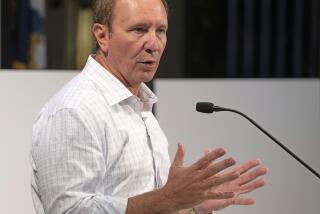Buchanan Puts High-Stakes Bet on Louisiana Contest
- Share via
METAIRIE, La. — Chafing over his failure to break out of the pack in the Republican presidential race, Patrick J. Buchanan is plunging headlong into next month’s Louisiana caucuses against heavily favored Sen. Phil Gramm of Texas--a bid that represents the biggest gamble of his political career.
Success would gain increased attention and respect for Buchanan’s message of economic discontent--the theme around which his campaign is focused. It is a message that he believes foreshadows realignment of the social and economic bases of the two major political parties.
On the other hand, a poor showing in the Feb. 6 contest, into which he has poured a large chunk of his limited resources, could hasten the demise of his candidacy.
As he stumped here earlier this week Buchanan seemed to relish the underdog role. “Phil Gramm’s high-priced consultant said the 21 delegates in Louisiana are in Phil’s hip pocket,” Buchanan told a boisterous rally in this New Orleans suburb. “I’m down here to tell you they’re not. He’s not going to get all 21 delegates. We’re going to pick his pocket.”
It may not be that easy. But what better place to test Buchanan’s indictment of the corporate and political establishment than among the bayous where, half a century ago, Huey Long’s fiery populism took root and where his impassioned rhetoric still reverberates.
Like the legendary Kingfish, who dominated politics here as governor, senator and sometime presidential aspirant, Buchanan aims not only at gaining high office but at reshaping the national political landscape. Where Long sought to use populism to challenge Franklin D. Roosevelt’s New Deal, Buchanan now attacks the corporate power he sees as dominating the GOP, and warping the conservative movement that defined his early career.
“We conservatives believe in free enterprise, we believe in the values of family and community,” Buchanan said in an interview. “But when go-go global capitalism is uprooting entire communities and families, I ask conservatives to figure out what it is we’re trying to conserve.”
Populist Themes Hit Home
Though Buchanan’s razor tongue produces high negative ratings in the polls elsewhere in the land, voters here seem to prefer their political rhetoric like their Cajun cuisine--with a bite. “I like the way he speaks his mind and tells it like it is,” said Bob Fennett, a Baton Rouge lawyer, after listening to Buchanan pound away at trade deals that, he argues, cost Americans jobs and mainly benefited huge corporations.
“I think folks here are sick and tired of these mealy-mouth politicians. And I think NAFTA (North American Free Trade Agreement) has shipped a lot of jobs overseas.”
Buchanan did not create his populist themes to suit the Louisiana climate. They have undergirded his candidacy in every state.
In a recent swing through New Hampshire, for example, he denounced his leading rivals. “They are the candidates of corporate America, and I am the candidate of middle America,” he charged.
He derided Gramm, in particular, for boasting of his prowess as a fund-raiser. “Those are not contributions, those are investments” intended to sway Gramm’s Senate votes, Buchanan said of the millions that Gramm has taken in.
Because of rhetoric like that, Buchanan is now commonly described as a populist Republican, a label that not too many years ago would have been considered self-contradictory.
This new ideology has been made possible by several changes in American politics.
First, Ronald Reagan succeeded in bringing blue-collar former Democrats into the Republican Party--appealing to concerns over race, abortion and other social issues, said Johns Hopkins University political scientist Benjamin Ginsberg. “And once you get them in with social issues, you can appeal to them on economic grounds,” Ginsberg said.
Then, throughout the ‘80s and ‘90s, millions of blue-collar and white-collar workers have suffered a decline of living standards and wages, a point that Buchanan himself underlines.
“I think you judge the success of an economy not on whether your GDP (gross domestic product) is $6 trillion or $7 trillion but on whether the real income of working men and women is rising each year,” Buchanan said. “And that hasn’t been happening.”
Instead, Buchanan added, “the real income of working men and women who work with their hands and tools and machines is down 20% in 20 years.”
Finally, the road to the votes of blue-collar workers has been opened for Buchanan, some liberals charge, by the failure of the Democratic Party under President Clinton to address their plight.
“Remember, Clinton got elected by raising many of these same issues that Buchanan is raising,” said Mark Levinson, chief economist for District 37 of the American Federation of State County and Municipal Employees, a 125,000-member union local based in New York. While in office, Levinson complained, Clinton has been less concerned with boosting personal incomes than with cutting the national debt.
“The important thing is for the Democrats to go back to their base,” Levinson contended.
But while Buchanan is voicing populist themes that parallel those of Levinson and his fellow unionists, he remains a conservative, and the solutions he offers are far different from those put forward by unions and their remaining allies. Neither boosting the minimum wage nor more militant unionism can stop the loss of jobs in key industries and the decline in wages so long as companies are free to go overseas, Buchanan argues. His answer is to boost tariffs on goods from countries that have an unfair trade advantage over the United States.
“In other words, if you go abroad, you are going to pay an admission price to get your products back into the United States,” he said.
Despite those factors that could boost his ideology--factors that Buchanan believes will lead to a wholesale realignment of the two major political parties--his efforts to forge a blue-collar populist Republican coalition face several major hurdles.
The first is Gramm. For months, the Texas senator has traveled across the border to strum this state’s GOP hierarchy like a guitar while the other major candidates have shied away. His efforts have gained him the support of all three elected Republican members of the state’s congressional delegation and several members of the Legislature as well.
Beyond that, despite the support Republican candidates have been able to get from blue-collar workers in general elections, Buchanan may face much more difficulty gaining support for his anti-free trade, anti-big corporation rhetoric in the GOP primary contests.
“It’s very hard,” Buchanan conceded in an interview. “What is hard is that people who are doing well in the go-go global economy, the heavy hitters, they finance the Republican Party.”
Still, Buchanan contends the tide is shifting in his direction. “The Republican Party at the grass roots is a Buchananite party,” he insisted. “Take a look at the polls in Iowa,” which show strong sentiment for punishing companies that move their factories overseas.
Buchanan is not relying solely on his economic arguments, but is trying to link blue-collar economic anxieties with social and cultural concerns.
That linkage could be the key to Buchanan’s impact on American politics, according to some analysts, even those who disagree with his policy proposals. Buchanan has “put his finger on the right question,” said Harvard University government professor Michael Sandel, author of a new book about America’s political ferment, “Democracy’s Discontent.” The issue both liberals and conservatives have avoided is “the way in which economic power has contributed to the breakdown of moral and political authority.”
At a press conference in Baton Rouge this week Buchanan made a point of applauding the suspension of state affirmative action programs by newly elected Republican Gov. Mike Foster. And in his talk at the Metairie rally he called for an end to life tenure for federal judges as he denounced the Supreme Court for its rulings upholding abortion rights, limiting school prayer and bolstering the rights of criminal suspects.
Candidate Is Frequent Visitor
Despite Gramm’s intense wooing of Louisiana’s GOP, he has devoted large amounts of his limited resources to the contest. Buchanan has traveled to the state three times since December and plans two more visits before the Feb. 6 vote. His media advisor, Roy Fletcher, says the campaign intends to spend $350,000 on television ads in the state, fully one-third of what is budgeted for the New Hampshire primary.
Angela “Bay” Buchanan, her brother’s campaign manager, believes that if he can win 10 of the 21 delegates at stake, along with about 40% of the popular vote, he can claim a moral victory over Gramm. But anything less probably would be considered a waste of the precious resources Buchanan is expending here.
But whatever doubts Buchanan may have about his chancy Louisiana enterprise, the former Nixon and Reagan White House aide takes comfort in the belief that his first political boss and mentor would have approved. “Nixon would have called it a big move and said: ‘You got to do it,’ ” Buchanan said.
More to Read
Get the L.A. Times Politics newsletter
Deeply reported insights into legislation, politics and policy from Sacramento, Washington and beyond. In your inbox twice per week.
You may occasionally receive promotional content from the Los Angeles Times.










